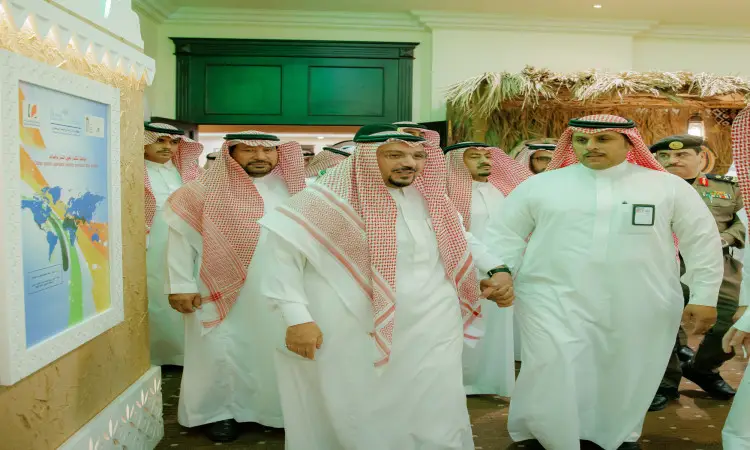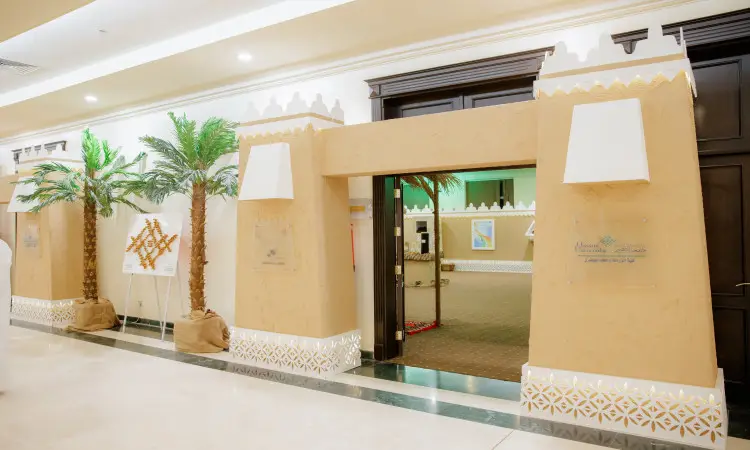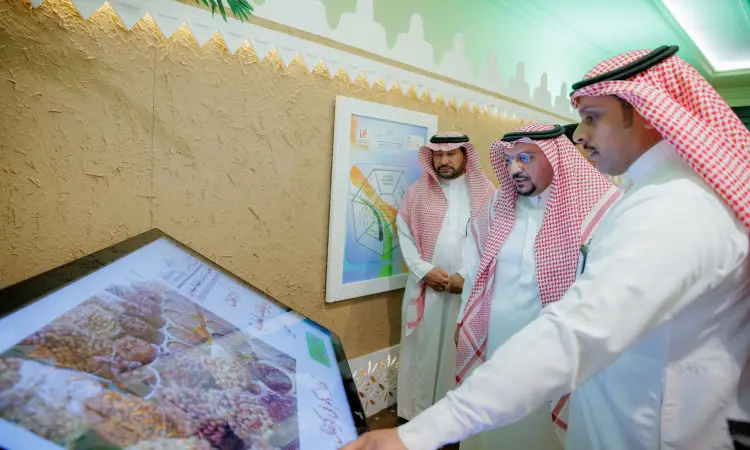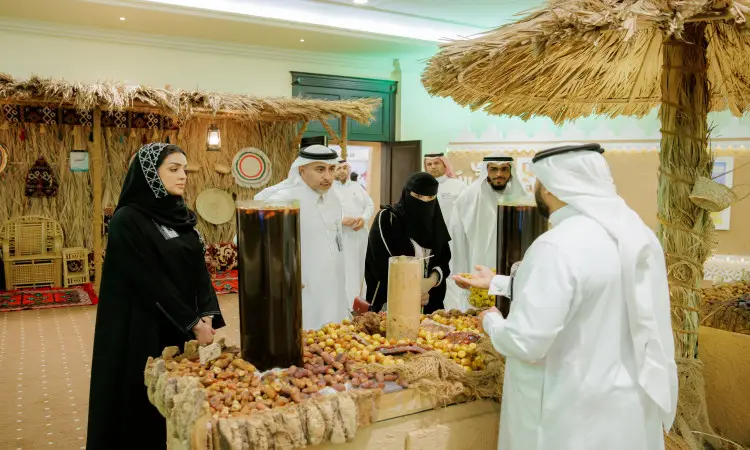His Royal Highness Prince Dr. Faisal bin Meshal bin Saud bin Abdulaziz, Governor of Qassim Region, visited the Qassim University pavilion participating in the Buraydah Dates Carnival, where he viewed the content of the "Palm" exhibition, in the presence of the Dean of the College of Agriculture and Veterinary Medicine, Prof. Saleh bin Sulaiman Al-Huwairini, at the Dates City in Buraydah.
His Highness was briefed on the university's exhibition represented by the College of Agriculture and Veterinary Medicine, which comes within the framework of the university's constant endeavor to participate in events that serve the agricultural and industrial sectors. The college is holding its exhibition on "The Palm" for 32 days during the period from 14 Muharram until the fifteenth of Safar 1445 AH, as part of the university's steps to achieve its mission in community service aligned with the objectives of the Kingdom's vision.
Through this exhibition, the university aims to provide date growers, traders and manufacturers with the necessary technical and logistical support to promote this important industry in line with the university's vision and mission to serve the community and to achieve Vision 2030 in supporting local output, promoting internal resources, maximizing their use, and raising the Kingdom's status in all international forums.
The exhibition includes a full pavilion about the university and the palm tree, reflecting its keenness on this blessed tree. The exhibition also provides a detailed explanation of the most important achievements of the university in serving the palm tree, in terms of its interest in scientific studies and research related to it, its cultivation, pest resistance, date processing and its by-products, and the university's efforts that provide a continuous bridge between those working in this field and the scientists and researchers of the college, in addition to presenting books and guidance pamphlets on the palm tree. In addition to providing books and guidebooks on the date palm, in addition to organizing seminars, conferences and workshops interested in the date palm, and showcasing the university's participation in local and international exhibitions and festivals to highlight the Kingdom's role at the international and local levels.
The exhibition also includes information about the red palm weevil convoys organized by the university to familiarize farmers and interested parties with ways to prevent this pest, as a large number of farms benefited from these convoys, in addition to displaying the scientific awards established by the university, including the Sheikh Abdullah Al-Sulaiman Joud Award, which is supervised by the College of Agriculture and Veterinary Medicine and offers one million riyals every two years to winners and researchers in the field of date palms.
The university was also keen to have a section on the production of the date palm that deals with the multiple benefits of dates to humans from the therapeutic and nutritional point of view, as well as real models of the date palm, including a model of the most important diseases and pests that affect it, with insect models and real pests to explain information about them to visitors, as well as a real model of the date palm with its most important real and secondary products, and a model of a date palm under which the most important varieties of dates for which the Kingdom is famous are placed underneath it.
Workers at the university's exhibition on the date palm are keen to showcase date by-products and the manufacturing industries that extract several products from the fruit, including: Date juice "molasses", vinegar industry, yeast industry, jam industry, animal feed industry, and composting of palm waste, where palm waste is chopped to be used to feed the soil and create a suitable agricultural environment for agriculture that retains water and helps improve the properties and fertility of the soil, in addition to preserving the environment and stimulating the factors of sustainability.
Examples of secondary industries based on the palm tree are also presented. Palm trunks are used to make furniture, wood and roof trusses, palm fiber is used to make ropes, mattresses, pedals and artificial soil, in addition to utilizing the arjun in the manufacture of alternative fibers to bamboo and used as biofuel, and the leaves of palm trees (fronds) are used in the manufacture of roofing, wall cladding, traditional furniture, parquet, and panels The leaves of palm trees (fronds) are used in the manufacture of roofing, wall binding, traditional furniture, parquet, wood panels, paper pulp, animal feed, organic fertilizer, and palm frond products, including baskets and thermal insulation materials.
The exhibition provides visitors with a range of valuable scientific information and resources, including methods of palm propagation and disease control, the classification and geography of the date palm, as well as a presentation of the most important types of dates in the Kingdom in general and Qassim in particular, where they are cultivated and produced in the Qassim region, where there are favorite varieties that are famous for them, such as Sukari, Saqi, Hashishi and Khalas Qassim, in addition to other varieties from outside the region, such as Majdoul types and city ajwa and other varieties of different types.







